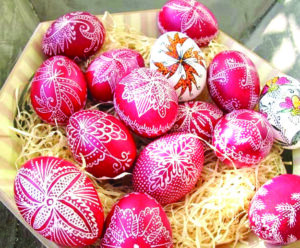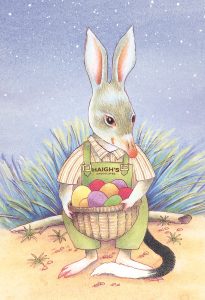By Dr. Beth Leermakers
Bunnies deliver Easter eggs and other treats to children in most — but not all — parts of the world. Let’s take a look at a few other animals that deliver eggs and star in Easter traditions/celebrations.

Photo courtesy of Pinterest
Easter Fox. Until 50 years ago, the Easter Fox (aka Osterfuchs) was Germany’s Easter animal. The day before Easter, German children made nests of moss and hay for the fox and locked up their pets so they wouldn’t disturb the magical egg-bearing visitor. On Easter morning the children hunted for his yellow Fuchseier (fox eggs).
The association between foxes and Easter eggs may come from a German tradition involving the Pentecost fox (Pfingstfuchs). On Pentecost (50 days after the resurrection), people walked from house to house, leading a fox on a leash and asking for donations. People gave eggs because that was the only food available at that time of year. The people who went door to door asking for handouts were mostly unmarried men visiting the homes of single women.
In German-speaking countries, several other animals also delivered Easter eggs: the Easter rooster (Saxony), the stork (Thuringia) and the Easter chick. In the past several decades, the Osterhase (Easter hare) took over egg deliveries, putting the other animals out of business.
Cuckoo. In Switzerland, the Cuckoo bird is the symbol of growth and rebirth. On Easter morning, Swiss children hunt for colored eggs and chocolate eggs (Of course! It’s Switzerland!) left by the Easter Cuckoo.
Cuckoo birds lay their eggs in the nests of other bird species. Instead of raising their own young, cuckoos leave nest building, protecting the eggs and feeding their young to other unsuspecting birds. The cuckoos trick the other birds into thinking the cuckoo eggs are their own. Leaving Easter eggs for children is right up their alley!
Doves. In Italy, the Easter Bunny does not exist. Instead, it’s all about eggs, the symbol of rebirth and renewal. Italian chocolate eggs range from tiny solid ones to beautifully wrapped foot-high hollow eggs with a gift inside. For children, the chocolate eggs are stuffed with a surprise toy. Ready-made chocolate eggs for adults may contain costume jewelry or sunglasses, while custom-stuffed chocolate eggs can hold an engagement ring or special gift.
The traditional Italian Easter cake is called Colomba, which means dove. What’s the significance of doves at Easter? There are several legends regarding the origins of the Columba, and no one knows which one is closest to the truth.

Photo courtesy of Wakefield Press
According to one story, soldiers in Milan were fighting off invaders on Easter Day in 1176. The Milanese were on the brink of losing the battle when three doves flew over the city. Shortly afterward, the battle shifted and the Milanese vanquished the invaders. According to the legend, the Milanese celebrated their victory by eating cakes shaped like the doves who saved them.
According to a similar legend, the Columba dates back to the battle of Legnano (in 1176). A leader of the Lombard League (an alliance formed to resist Holy Roman Emperor Frederick I) saw two doves perched on the League’s insignia. The doves remained there even when the battle was approaching.
Interpreting this as a prophecy of peace, the general ordered the cooks to prepare dove-shaped bread loaves with eggs, flour and yeast.
Bilby. The bilby (aka rabbit-bandicoot) is a rodent-like marsupial (picture a rat with big rabbit ears) native to Australia. The Easter Bilby delivers treats to Australian children. Rabbits are unpopular in Australia, where they destroyed thousands of acres of crops after being introduced in the 1800s. Rabbits, who are hardly a sign of growth and rebirth as far as Australians are concerned, lost the egg delivery gig to the Bilby.
Easter bunny with a twist. In Greece, the Easter Bunny only delivers red eggs. Red is the color of life and represents Christ’s blood. Eggs are a symbol of the renewal of life.
In Greek tradition, the red Easter eggs symbolize victory over death.
Whether your Easter eggs arrive by bunny, fox or cuckoo, I hope you enjoy them and have a wonderful celebration. Happy Easter!
